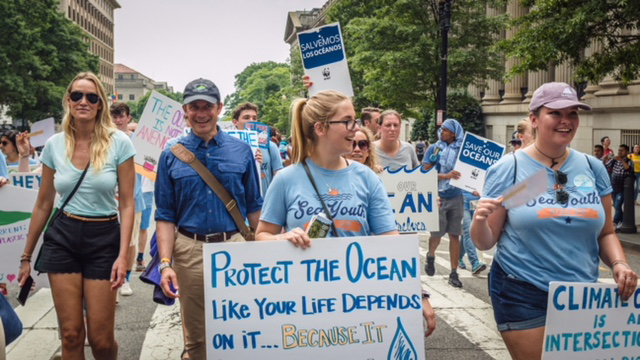 Baylee Ritter (center), a senior at DePaul, took part in the March for the Ocean on Capitol Hill in spring 2018. (Image courtesy of Baylee Ritter)
Baylee Ritter (center), a senior at DePaul, took part in the March for the Ocean on Capitol Hill in spring 2018. (Image courtesy of Baylee Ritter)
Coming from McDowell, a small town near Central Illinois, Baylee Ritter knew she wanted to attend college in a big city so she had a larger audience to which she could spread her message about caring for the earth.
"My heart was immediately at DePaul," says the now senior studying public relations and advertising, and communications studies, with a minor in environmental communications. "The environment on campus and the environment of an urban place, I knew, provided me the ability to bridge the gap between communications and environmental advocacy."
Communications and the environment might not seem to be a likely pair, but Ritter has pursued the two studies in an interesting and inspiring way.
"Environmental science and studies has a lot of facets to it," Ritter says. "There is boots-on-the ground-advocacy, lab work, research—the list goes on. Most of the public won’t understand what that work means. It takes a person in the middle to interpret the often complex science and communicate it to those who might not otherwise understand the information.
Ritter’s goal is to use her education to translate environmental concerns and scientific data, and create campaigns that allow the average citizen to create change in their own life.
"It’s the most perfect work I could be doing," she says. "I believe the science and the ability to communicate that science are equally important, and I’m passionate about both."
Ritter’s environmental communications journey began in 2007. At the time, Ritter established the Prescription Pill and Drug Disposal Program, also known as P2D2, with her dad. P2D2 sought to educate people on proper prescription pill disposal and the effects of improper disposal on our water systems.
In addition to the P2D2 program, Ritter now sits on the World Oceans Day Youth Advisory Council, which is comprised of 30 youth representatives from around the world. Ritter is one of the two council members from the United States. The council helps prepare for the annual World Oceans Day celebration on June 8.
During summer 2018, she wanted to do something different for World Ocean Day in her town—something that would catch people’s attention in an accessible, understandable way. So she and students from her former high school built a boat out of trash.
Ritter couldn’t help but notice in her hometown, a community along the Vermilion River, no one seemed to have the urgent need that she had to protect the ocean. This was not due to a lack of caring, but rather because there are so many issues in rural America that the ocean isn’t necessarily the first thing on anyone’s priority list. She surmised the reason was the lack of proximity to an ocean.
"I wanted to make a statement that everyone should care," Ritter says. "We all depend on the ocean, no matter how far from it we might live."
So she and her father, an environmental science teacher at a local high school, got to work building a boat made from plastic waste found in nearby rivers and lakes. Once they completed the boat, they planned to sail it down the river to demonstrate how plastic waste travels from one water source to another, and eventually to the world’s oceans, polluting them.
"We went out and collected all kinds of trash: water bottles, plastic bags—anything," Ritter says. Her father enlisted students from his environmental science class to work on the project with them. "The students were all so invested and they each had their own task—one kid even learned how to build a rope from shredded water bottle strands on YouTube," Ritter adds.
In the end, the project was a success and piqued the interest of many people in her hometown. Ritter and her father sailed 2.5 miles down the Vermilion River, only stopping because of a rain storm. For Ritter, there is simply no better way to educate than to clearly, and cleverly, demonstrate the problem and make people curious about the matter.
"The idea definitely came from my study of communications: how do we get people involved in discussions they wouldn’t normally get involved in?" she explains. "How do we translate the importance of the ocean to people who can’t directly see it? How can we show people their actions do make a difference?"
In this case, the answer was a boat made from garbage.
Originally published on DePaul Newsline.